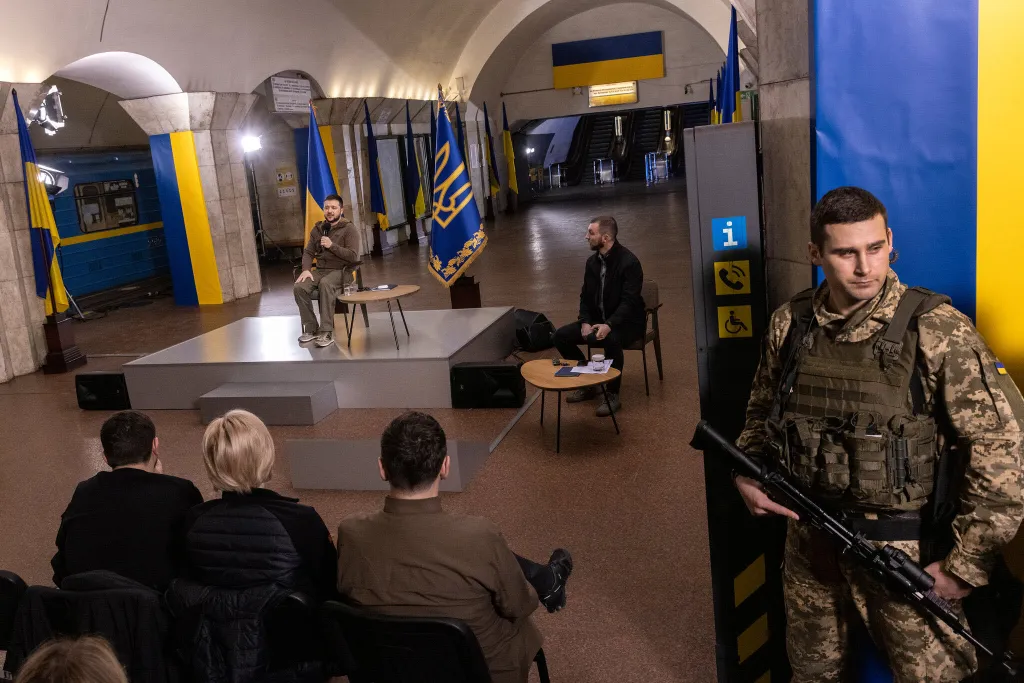We Need a Real Debate about the Ukraine War
IN FOCUS, 30 May 2022
Katrina vanden Heuvel | The Washington Post - TRANSCEND Media Service
Bringing the war in Ukraine to an end will demand new thinking and challenges to the orthodoxies of this time.

President Volodymyr Zelensky speaking at a news conference in Kyiv on April 23. [manhhai / CC BY-NC 2.0]
24 May 2022 – It’s time to challenge the orthodox view on the war in Ukraine.
As Russia’s illegal and brutal assault enters its fourth month, the impact on Europe, the Global South and the world is already profound. We are witnessing the emergence of a new political/military world order. Climate action is being sidelined as reliance on fossil fuels increases; food scarcity and other resource demands are pushing prices upward and causing widespread global hunger; and the worldwide refugee crisis — with more international refugees and internally displaced people than at any time since the end of World War II — poses a massive challenge.
Furthermore, the more protracted the war in Ukraine, the greater the risk of a nuclear accident or incident. And with the Biden administration’s strategy to “weaken” Russia with the scale of weapons shipments, including anti-ship missiles, and revelations of U.S. intelligence assistance to Ukraine, it is clear that the United States and NATO are in a proxy war with Russia.
Shouldn’t the ramifications, perils and multifaceted costs of this proxy war be a central topic of media coverage — as well as informed analysis, discussion and debate? Yet what we have in the media and political establishment is, for the most part, a one-sided, even nonexistent, public discussion and debate. It’s as if we live with what journalist Matt Taibbi has dubbed an “intellectual no-fly zone.”
Those who have departed from the orthodox line on Ukraine are regularly excluded from or marginalized — certainly rarely seen — on big corporate media. The result is that alternative and countervailing views and voices seem nonexistent. Wouldn’t it be healthy to have more diversity of views, history and context rather than “confirmation bias”?
Those who speak of history and offer context about the West’s precipitating role in the Ukraine tragedy are not excusing Russia’s criminal attack. It is a measure of such thinking, and the rhetorical or intellectual no-fly zone, that prominent figures such as Noam Chomsky, University of Chicago professor John Mearsheimer and former U.S. ambassador Chas Freeman, among others, have been demonized or slurred for raising cogent arguments and providing much-needed context and history to explain the background of this war.
In our fragile democracy, the cost of dissent is comparatively low. Why, then, aren’t more individuals at think tanks or in academia, media or politics challenging the orthodox U.S. political-media narrative? Is it not worth asking whether sending ever-more weapons to the Ukrainians is the wisest course? Is it too much to ask for more questioning and discussion about how best to diminish the danger of nuclear conflict? Why are nonconformists smeared for noting, even bolstered with reputable facts and history, the role of nationalist, far-right and, yes, neo-Nazi forces in Ukraine? Fascist or neo-Nazi revivalism is a toxic factor in many countries today, from European nations to the United States. Why is Ukraine’s history too often ignored, even denied?
Meanwhile, as a former Marine Corps general noted, “War is a racket.” U.S. weapons conglomerates are lining up to feed at the trough. Before the war ends, many Ukrainians and Russians will die while Raytheon, Lockheed Martin and Northrop Grumman make fortunes. At the same time, network and cable news is replete with pundits and “experts” — or more accurately, military officials turned consultants — whose current jobs and clients are not disclosed to viewers.
What is barely reflected on our TVs or Internet screens, or in Congress, are alternate views — voices of restraint, who disagree with the tendency to see compromise in negotiations as appeasement, who seek persistent and tough diplomacy to attain an effective cease-fire and a negotiated resolution, one designed to ensure that Ukraine emerges as a sovereign, independent, reconstructed and prosperous country.
“Tell me how this ends,” Gen. David Petraeus asked Post writer Rick Atkinson a few months into the nearly decade-long Iraq War. Bringing this current war to an end will demand new thinking and challenges to the orthodoxies of this time. As the venerable American journalist Walter Lippmann once observed, “When all think alike, no one thinks very much.”
_____________________________________
 Katrina vanden Heuvel is editorial director and publisher of The Nation and served as editor of the magazine from 1995 to 2019. She has edited or co-edited several books, including The Change I Believe In: Fighting for Progress in the Age of Obama (2011) and Meltdown: How Greed and Corruption Shattered Our Financial System and How We Can Recover (2009).
Katrina vanden Heuvel is editorial director and publisher of The Nation and served as editor of the magazine from 1995 to 2019. She has edited or co-edited several books, including The Change I Believe In: Fighting for Progress in the Age of Obama (2011) and Meltdown: How Greed and Corruption Shattered Our Financial System and How We Can Recover (2009).
Go to Original – washingtonpost.com
Tags: Conflict Mediation, NATO, Proxy War, Russia, USA, Ukraine
DISCLAIMER: The statements, views and opinions expressed in pieces republished here are solely those of the authors and do not necessarily represent those of TMS. In accordance with title 17 U.S.C. section 107, this material is distributed without profit to those who have expressed a prior interest in receiving the included information for research and educational purposes. TMS has no affiliation whatsoever with the originator of this article nor is TMS endorsed or sponsored by the originator. “GO TO ORIGINAL” links are provided as a convenience to our readers and allow for verification of authenticity. However, as originating pages are often updated by their originating host sites, the versions posted may not match the versions our readers view when clicking the “GO TO ORIGINAL” links. This site contains copyrighted material the use of which has not always been specifically authorized by the copyright owner. We are making such material available in our efforts to advance understanding of environmental, political, human rights, economic, democracy, scientific, and social justice issues, etc. We believe this constitutes a ‘fair use’ of any such copyrighted material as provided for in section 107 of the US Copyright Law. In accordance with Title 17 U.S.C. Section 107, the material on this site is distributed without profit to those who have expressed a prior interest in receiving the included information for research and educational purposes. For more information go to: http://www.law.cornell.edu/uscode/17/107.shtml. If you wish to use copyrighted material from this site for purposes of your own that go beyond ‘fair use’, you must obtain permission from the copyright owner.